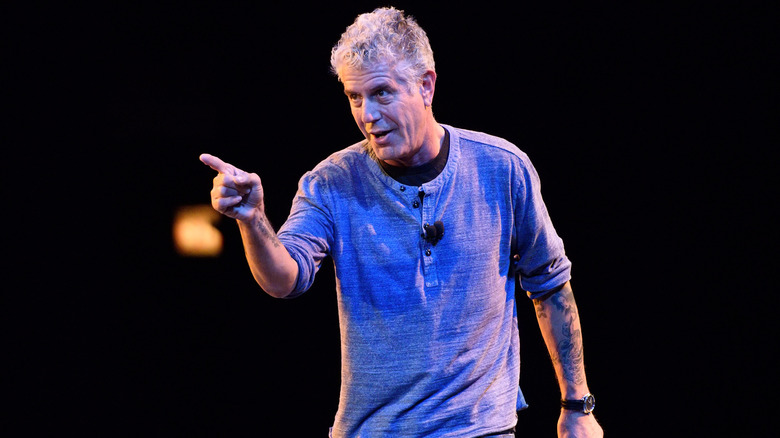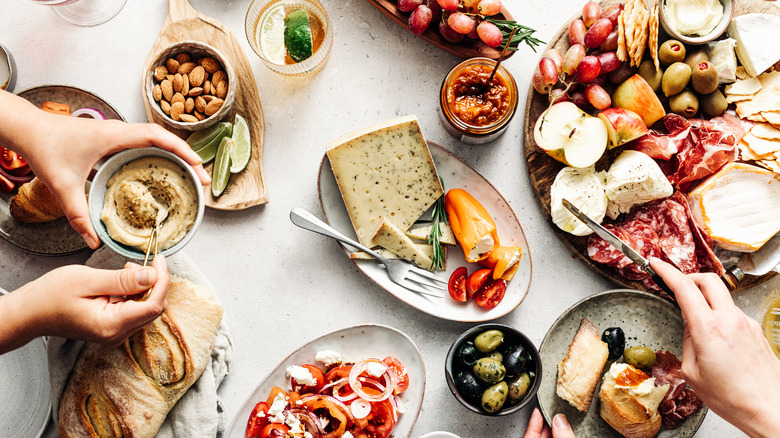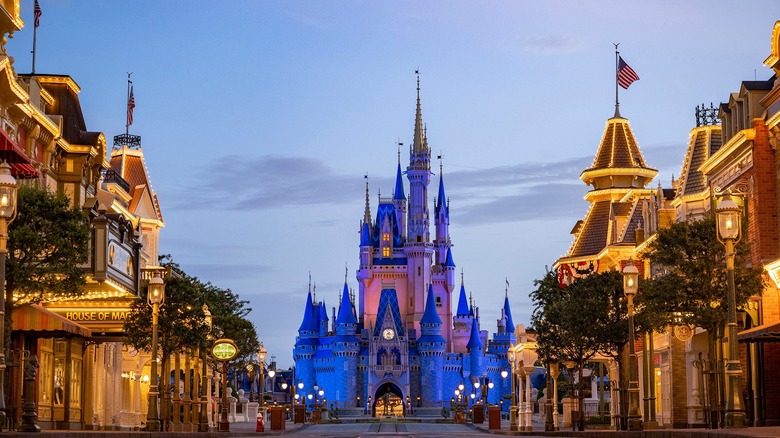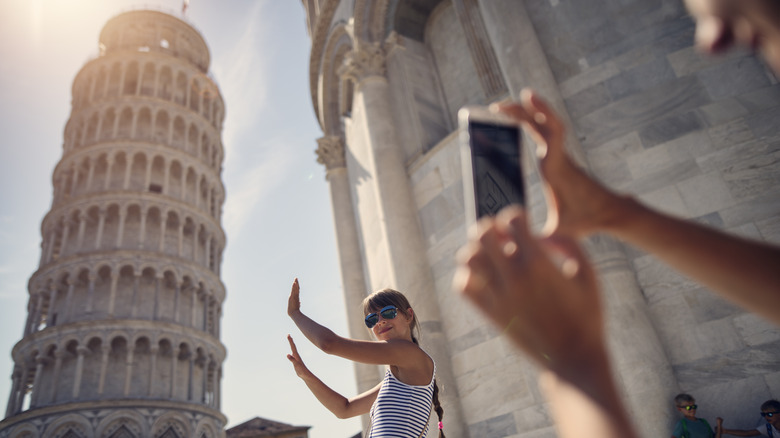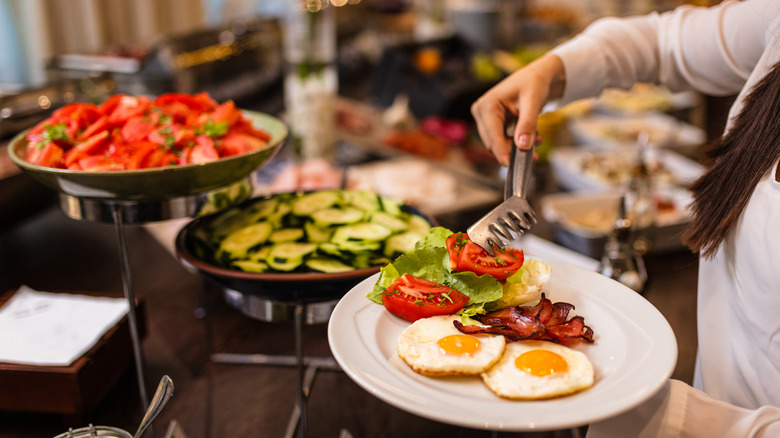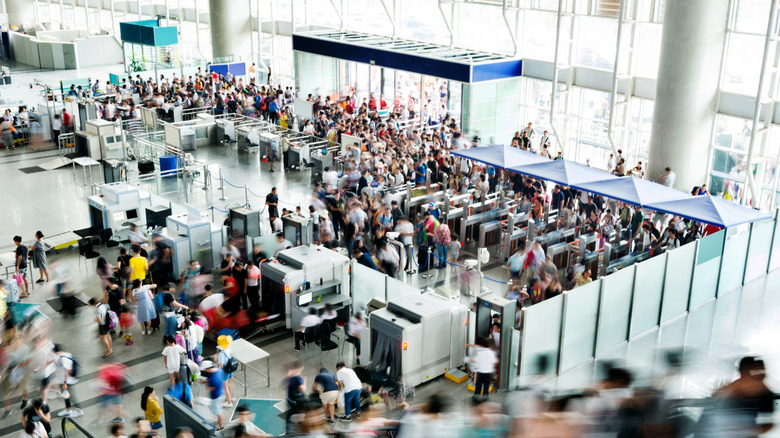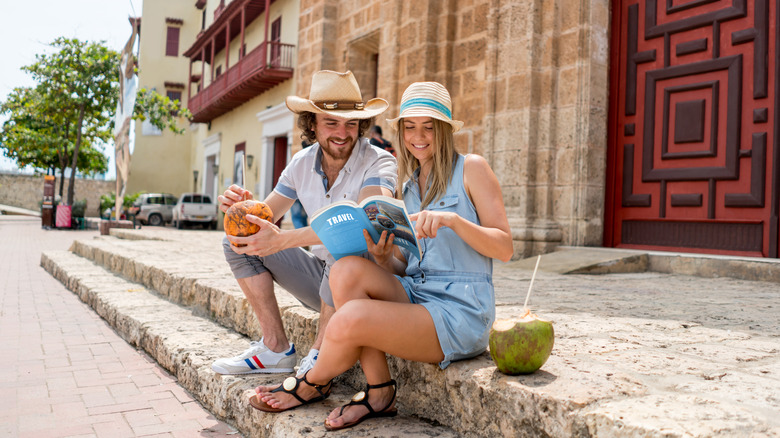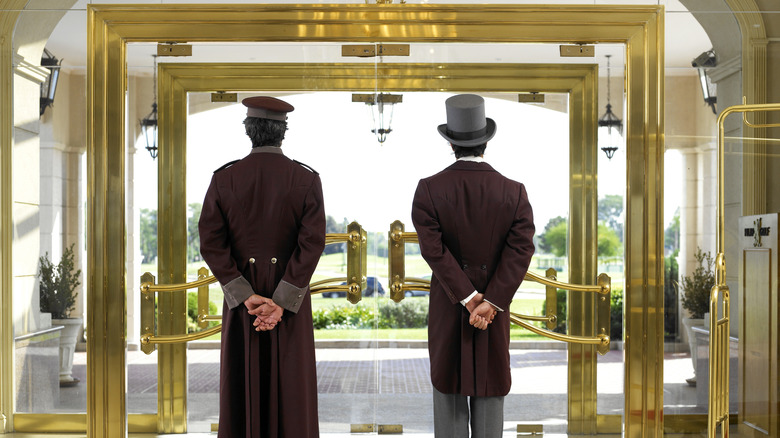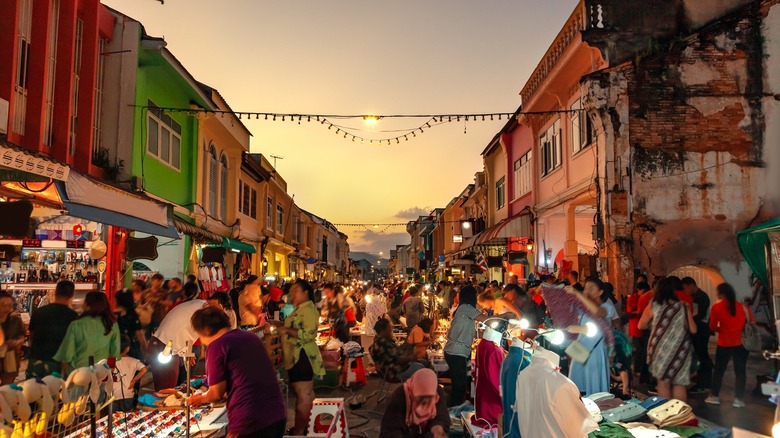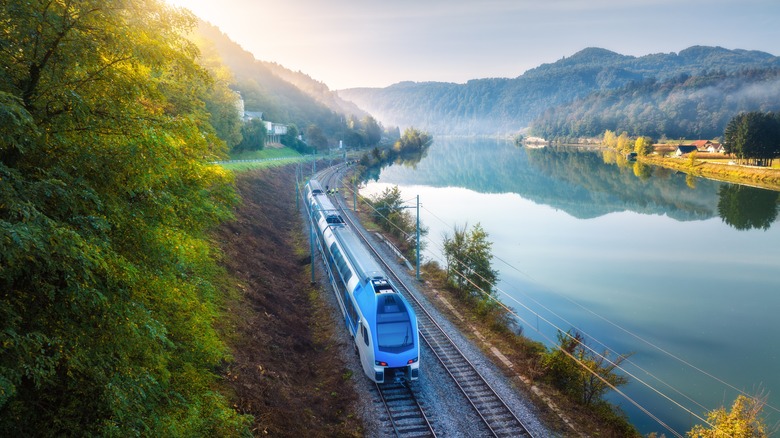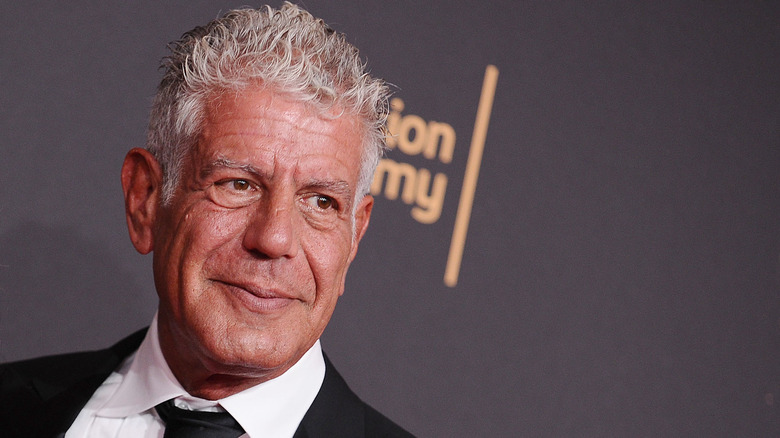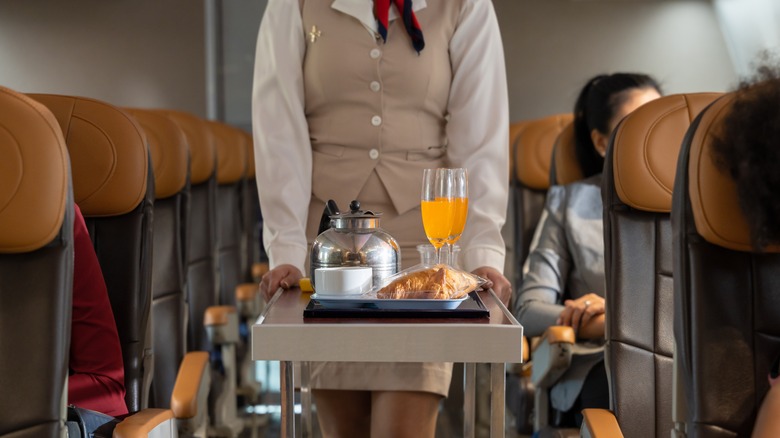Things Anthony Bourdain Always Avoided When Traveling
Celebrity travel shows with a foodie twist are a dime a dozen now, and we can at least partially thank Anthony Bourdain for that. His talent for slinging words and hitting us in the gut with hard truths while he explored destinations less traveled has yet to be fully matched. Bourdain brought a gritty, honest persona to our TV screens, and his voice likely narrates the travels of many fans. In his almost 20 years of on-screen exploration, Bourdain gave viewers many tips for both food and travel, but for as many recommendations he doled out to viewers, he also gave plenty of discouragements when it came to travel.
Whether he was speaking on when and where not to eat or how to plan your trip, Anthony Bourdain had some very strong opinions. And he was not the least bit shy about expressing these curated perspectives. Bourdain left this Earth after spending decades traveling it, and his legacy is the countless impressions he made on people all over the globe and the priceless advice he gave to would-be explorers. Other than the beaten path, here are some of the things that Anthony Bourdain avoided on his travels and urged others to avoid as well.
Brunch
Some people swear by a good brunch after a night of drinking, and there's something to be said for the midday weekend tradition. When it comes to Anthony Bourdain and his personal, celebrated tastes, brunch spots were not on his travel radar. While he considered eggs the "perfect food" and likely wouldn't pass them up no matter what time of day it was, he all but detested gimmicky brunch establishments. He had some very solid reasoning behind his distaste for the then-rising and now even more popular trend.
To Bourdain, brunch was a profitable way for restaurants to avoid wasting leftover meat and perishables from the previous week. Restaurants did this while also jacking up the price as they rode the demand for the trend. Basically, Bourdain found the trend to be ethically questionable and referred to the meal trend as "hideous." Note that part of this particular qualm with brunch is no longer the case, as it's popular enough to warrant separate stock orders.
According to Bourdain, chefs' pride takes a hit when it comes to brunch. "The "B" word is dreaded by all dedicated cooks," he wrote in his 1999 "Don't Eat Before Reading This" essay for The New Yorker. Being forced to cook pretentious and overpriced versions of classic breakfast dishes made the brunch shift a nightmare for cooks. As a fellow kitchen hand, Bourdain refrained from brunch spots in solidarity and, very likely, some painful memories.
Disney parks
There's a reason you can't really picture someone like Anthony Bourdain in a place like Disneyland. His curiosity about the world and the beautiful people in it was directed toward destinations that were yet largely uncovered. A large, world-renowned theme park that brings in tens of thousands of visitors daily isn't exactly a "part unknown." He also loved barebones simplicity, and you can't get further away from that ideal than a park that spends upwards of $35 million a year on fireworks.
Anthony Bourdain was, at his core, a food lover. Food fueled his travels just as much as his curious nature. Disney may have an impressively large range of food options available to guests, but the authenticity of dishes can be lacking. Disney's EPCOT prides itself on cultural representation in its World Showcase, allowing patrons to visit Africa, France, and Japan in one afternoon. Conversely, Bourdain had his radar on experiencing these cultures in the flesh. Disney actors and shadows of international flavors pale in comparison to the real and raw experiences Bourdain sought.
Tourist traps
It's not hard to find a picture of Anthony Bourdain with a cigarette in his hand and his middle finger raised. The image is so famous that it has been featured on many a t-shirt. You would, however, be hard-pressed to find a photo of the man posing in typical tourist fashion. Bourdain wasn't one to feign holding up the Tower of Pisa in Italy or kissing the Sphinx in Egypt. This is because Bourdain sought experiences that would teach him about local life and culture. He wasn't a standard traveler. If you're looking for genuine experiences, you shouldn't be a standard tourist either. With this goal in mind, tourist traps should be avoided at all costs.
After all, they're called "traps" for a reason. Travelers tend to find safety in their allure but walk away with a hit to their wallet and a false impression of the destination's authentic culture. To travel like Bourdain is to avoid the resorts, overhyped attractions, and establishments explicitly geared toward tourists. Instead, opt for places where you see locals hanging out. Talk to people and spend time in areas that market less to visitors and more to residents.
Eating the hotel's breakfast buffet
Despite spending much of his time breaking bread all over a city, Anthony Bourdain was rarely ill after eating on his travels. He went into a foreign land with the intent of experiencing life as locals do and seeing their culture through what they eat every day. He refused to eat in places specifically designed for tourists. Bourdain happily chowed down on cobra hearts, seal eyeballs, and a whole slew of animal testicles. However, he steered clear of the hotel breakfast buffets.
In fact, Bourdain said that those in the crew who did get sick usually did so by eating from the hotel's buffet. Instead of dining in tourist-friendly restaurants and easy options like hotel buffets, the worldly chef dined where he saw locals eating every day. Bourdain would often make a beeline for busy street vendors. Travelers should follow this lead and stick to the streets because the locals are eating there, and if they aren't getting sick, you won't either.
Bourdain would also frequently talk his way into a local home or community for an authentic home-cooked meal. It was easy for the charismatic and convivial (not to mention famous) travel host to make these connections. It certainly helped that he had "no reservations" about what he would consume. If you have the opportunity to break bread with a local, take it — no matter what may be on the menu.
Wearing jewelry or a belt
When your job revolves around traveling, and you spend most days of the year roaming the globe, you pick up some hacks to make the airport as seamless as possible. Airport regulations influenced how Anthony Bourdain dressed, as he was frequently subjected to security, and he wanted to get through the process swiftly. He didn't wear a belt and avoided wearing jewelry to cut down on the things he would need to take off and put back on.
Airport security is one source of stress for many travelers. A significant part of this stress is due to the ability airports seem to have to create an environment that is simultaneously frantic and absurdly slow. Security lines can take forever to get through, though once you're at the screening belt, you feel as though you can't move fast enough. Bourdain all but eliminated the need to do much here by limiting the items he needed to put through the X-ray.
This hack exemplifies the easy, relaxed traveler persona Bourdain was known for. Forgoing these outfit extras actually helped turn him into a surprising style icon, with people loving his simple and practical fashion choices. Airports aren't fashion-forward places, but it's possible to look the part while also making it easy to get through security.
Guidebooks
If you know anything about Anthony Bourdain, you'll know he wasn't exactly the sort of traveler to use a heavily-curated guidebook. Those just weren't his types of places. Even if he were headed to a city popular with tourists, he wouldn't give a moment's thought to using a tourist guidebook. It can be tempting to overdo your due diligence when visiting a place for the first time, not wanting to miss out on anything. Some tourist attractions should probably be passed over, though, and you can find more authentic experiences outside of the ones detailed in travel guides.
Despite his avoidance of travel guides, Bourdain researched destinations with the help of books. He was an avid reader and read almost everything else he could get his hands on. The travel guru incorporated his love of literature with his career traveling the world. When it came to reading for travel, he stuck to literature set in a destination or by authors familiar with the culture in question. Bourdain would get the overall vibe of a place from the words and descriptions of people who spent an extended amount of time in a place, as opposed to the surface-level advice given by guidebooks.
Concierge services
We've mentioned it a few times, but it bears repeating. If you want to get to know a place, you go to the locals. Anthony Bourdain stressed this throughout his long travel career, and thus, he avoided using concierge services. The professionals inside hotels or other tourist-concentrated places are getting paid to tell you where to go. In addition to their hotel salary, some concierge services may receive kickbacks from places they suggest, even if this practice is frowned upon.
You may think you are getting personalized feedback based on what you ask for, but in reality, you're likely being pushed toward the same places everyone else is. In an interview with ShermanTravel, Bourdain said asking such services for a local experience won't get you very far. "No matter how many times you say you want to eat like the locals, their experience has told them that Americans want someplace clean and western-friendly, with a bathroom that's in good condition."
Instead of relying on paid advice, strike up a conversation with the locals. Your taxi or Uber driver can provide more than a ride, as they spend a lot of time taking both tourists and locals to places throughout the city. Ask them about hidden gems and some of their favorite places to eat or hang out. You might just find your new favorite spot.
Skimping when it came to hotels
Though he loved simple pleasures and championed a simple meal, Anthony Bourdain didn't mind splurging when it was worth it. Despite his opinions of breakfast buffets and concierge services, Bourdain happily spent a good deal of his budget on hotels. He wanted to find something that put him where the action — or culture — was.
Before going on your trip, research which neighborhood you want to explore. A lot of U.S. cities have fantastic ethnic neighborhoods that provide authentic food, art, and culture, celebrating the people who live there. For international destinations, find a neighborhood away from tourist traps that is within walking distance of a local market. Bourdain also took into account the hotel itself, opting for lodgings with unique features, like architecture or design.
Much has changed in the travel industry regarding hotels, though. Competition is fierce when it comes to options in cool parts of a city. Hostels are no longer barebones accommodations, with many cool hostels oozing culture while offering pretty hotel-standard professionalism and prices. Airbnb and Vrbo-type accommodations can also put you in a prime position for an authentic experience. Price doesn't always equate to quality, but be willing to spend a little extra to stay in the right location.
Relying on popular review sites
Anthony Bourdain considered sites like Tripadvisor and Yelp a waste of time. When he did use online content, he looked to food bloggers. By finding food bloggers local to the destination he was visiting, he was able to remotely scout out places residents loved. These local foodies were more likely to have visited and featured diamonds in the rough than public review websites were showcasing.
Another clever way Bourdain found the hidden gems was by using reverse psychology. He would go on smaller, forum-based sites and talk up one of his upcoming destination's not-so-great spots. The result would be a surge of what he referred to in an interview with Time (via CITI I/O) as "nerd fury," or keyboard warriors taking his bait and bashing his choice in favor of their own. People tend to like telling you about how wrong you are rather than offering positive suggestions, so this may work better than simply asking Reddit for advice.
City hopping
When Anthony Bourdain chose a travel destination, he deliberately chose a single destination to explore. He may have hopped around the city to uncover hidden gems, but he liked to stay in one central area to gain a real understanding of a place and scout it thoroughly. It can be tempting to try visiting as many cities as possible when shelling out PTO for a European adventure. However, spending your time really getting to know a single place will save you money and elevate your experience.
European public transport makes it so easy to country hop, but those train tickets can get pricey as you let your vacation be led by the tracks. Your feet are all you need when hunkering down in a walkable city. Walking gives you more opportunities to enjoy the city. It opens you up to see the sights, notice hidden shops or eateries, and open yourself up to conversations with the locals. Trade your fast-paced, country-hopping European vacation to slow travel, where you can immerse yourself in a new destination.
Censoring hard truths
More than anything, Anthony Bourdain wanted to have a positive impact on the places he traveled to and the locals he met along the way. Bourdain frequently started hard conversations and was fearless in pulling the curtain back and showing what other travel and food shows ignored. He recognized his privilege when traveling to war-torn and poverty-stricken locations and his responsibility when speaking of these places to the mainstream media.
Bourdain's visit to Beirut in 2006, when he and his team were surrounded by the violence of a military conflict, resulted in raw footage that was nominated for an Emmy. He was again recognized and won an award for his 2013 coverage of Palestine, but he did not accept the award quietly. He again used his platform to bring attention to the plight of the Palestinian people.
In his acceptance speech for the Voices of Courage and Conscience award, Bourdain said it took "very little courage and an ordinary amount of conscience" to produce his "Jerusalem" episode of "Parts Unknown." He pointedly addressed how depicting people living their lives should not "come as a shock," calling out how there can be a lack of humanity in the media. This raw honesty was what the world came to expect from Bourdain, especially when handling the morality of human beings.
Airplane food and alcohol
Believe it or not, the world-famous chef and food journalist frequently opted for airport food. While this wasn't always fruitful for the tastiest meals, he did find some diamonds in the rough while waiting to board. When it came to the food on the actual plane, though, Anthony Bourdain avoided airplane food and would rather go without it.
His reasoning for this was not only that airplane food isn't good but that he wanted to begin his experience at a destination with hunger. Despite claiming in an interview with bon appètit that he never wanted to eat airplane food, Bourdain did make allowance for some cheese on a long flight. In a very French move, he paired the meager meal with port wine and made do.
Though Bourdain did indulge in wine or a good scotch on the rocks while up in the air, he didn't drink to get drunk. When speaking to Esquire, he revealed that drinking to excess on the plane is also a no-go. Bourdain preferred to avoid jet lag and catch some shut-eye instead.
